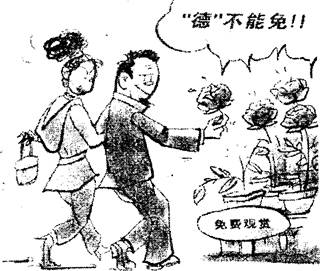第二节 书面表达(共1题,满分30分)

上图反映的是部分博物馆、纪念馆、人民公园等公共场所执行国家免费开放政策后所遇到的一些新问题。请简要描述图画内容,对图画所反映的社会现象做出自己的评述并提出解决的办法。
注意:1.词数 120-150。
2.参考词汇:道德 morality
One possible version:
As the picture shows, the lovely flowers are welcoming the visiting couple when the man picks one. That annoys the flowers, making them shout angrily, “You can’t be free of morality.”
The above reflects that nowadays it’s common for visitors to act at will in the public places due to their lack of morality. Their numb behavior has resulted in great damage to the places of interest – part of our common home. Isn’t it high time we took measures to correct the wrong doings?
In my view, the following might work. Firstly, why not promote the public’s awareness of preserving the public places through various activities concerning morality? Secondly, more tips or signs can be put up in the museums or parks. The sight of them can remind visitors to behave well. Lastly, strict rules can be laid down to restrict those who are loose in their doings.
